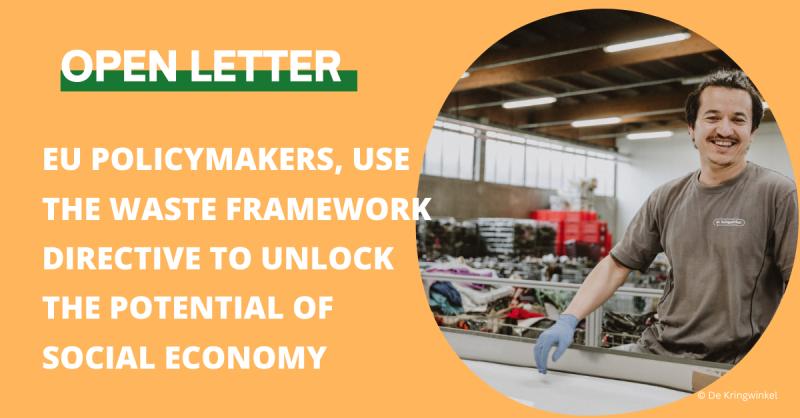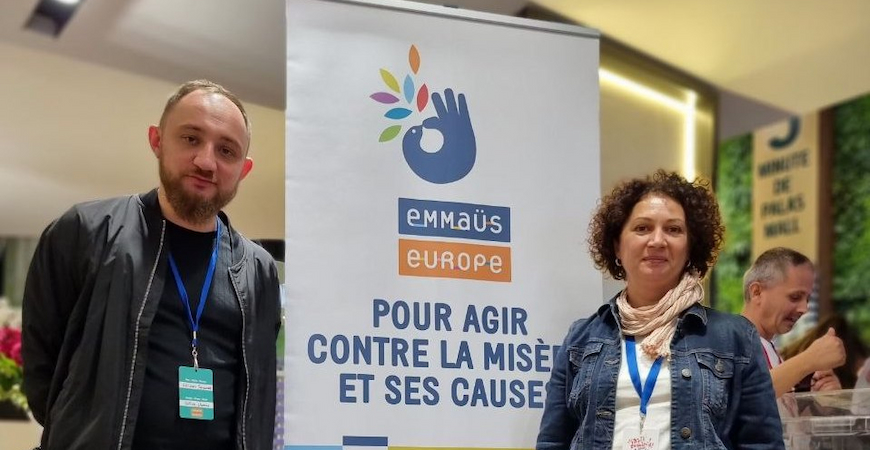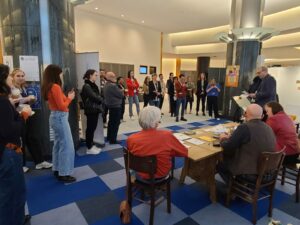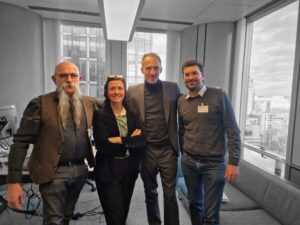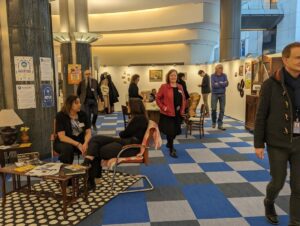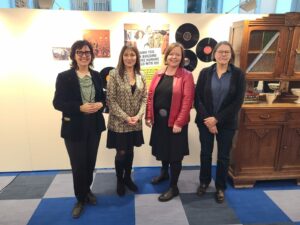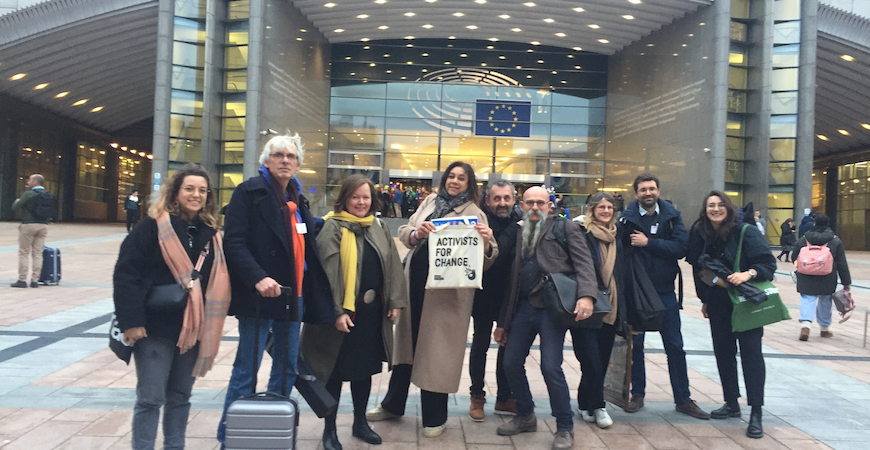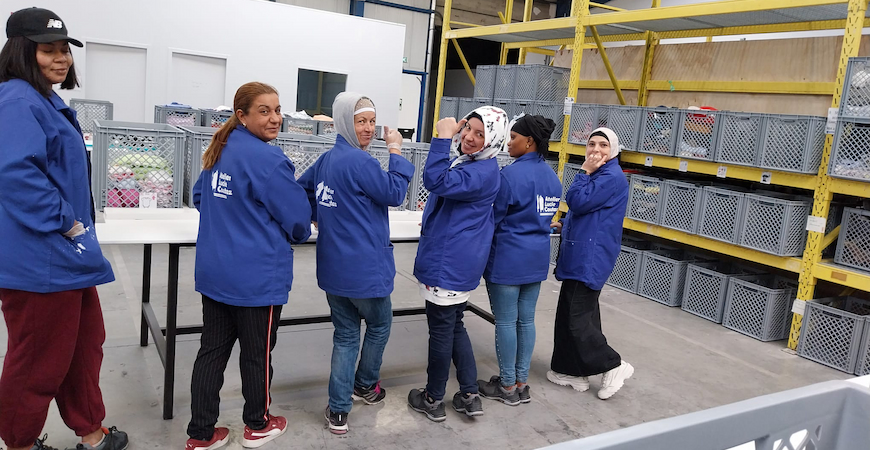Russia’s large-scale invasion of Ukraine began on 24th February 2022. For the last two years the Emmaus Oselya group has been putting up daily resistance in Lviv with its own weapons: solidarity, mutual support, and unconditional welcome of vulnerable people; along with ideas and initiatives to keep helping those who suffer most. We spoke to Natalia Sanotska, Director of Oselya, and Grigory Semenchuk, the National Delegate for Ukraine. Together we discussed domestic politics, the local context in Lviv, and the daily life of an Emmaus group in a country at war.
Could you give us an update on the political situation and mobilisation?
Grigory: The presidential and parliamentary elections, which should have taken place in 2024, have been postponed indefinitely due to the war (5-year term, last elections in 2019). Ukrainians living in the occupied areas wouldn’t be able to vote, it wouldn’t be possible to campaign nor ensure voters’ safety. Moreover, the Constitution does not permit elections to be held while the country is at war.
Parliament is preparing a new mobilisation law. It has been under discussion for the last two months, and will mainly help to better define the conditions for those mobilised for combat duty to replace people at the front: duration, people affected, minimum age for mobilisation (which will be lowered from 27 to 25), and so on.
Natalia: Although there are fewer volunteers to go to the front, most people understand that it’s necessary to avoid occupation.
What is the situation like in Lviv? Have the profiles of the people taken in by Oselya changed since the start of the conflict?
Grigory: The overall situation has stabilised. Some people are still arriving in Lviv, fleeing the fighting, but the numbers are lower than in 2022. Victims prefer to seek shelter near their homes, around Kharkiv, Dnipropetrovsk.
Natalia: However, cities like Kyiv, Lviv and the western part of Ukraine have not been spared by the bombings. The most recent bombings in Lviv were at the start of January; the situation is still very difficult. Last week, for example, (editor’s note: in mid-January), Kharkiv was bombed every day, forcing people to flee westwards.
Grigory: At the start of the war, a lot of emergency housing was set up to accommodate everyone. Quickly these temporary shelters were closed, forcing people to find accommodation and get back to work, if possible.
Natalia: This placed significant pressure on the rental market, and rents went up dramatically. A new status has appeared: “poor workers”. These people have very little income and can no longer pay their rent and bills. The war has pushed a whole section of society into precarious situations. Many displaced people are now sleeping in shacks, without electricity or water, or in plastic huts, in Lviv or on the outskirts.
These people are therefore also welcomed at the new social centre, and during food distributions, alongside homeless and internally displaced people. Oselya and civil society are replacing the work of government social services and trying to find solutions, with the state concentrating primarily on the war effort.
We’re talking a great deal about mental health at the moment. How is this being cared for, given that war-related traumas affect the entire population?
Natalia: In Oselya, a psychologist works with the companions in the community. We work with the Order of Malta, which also pays the salaries of a psychologist and a social worker who are on hand one day a week to help people attending the social centre.
Grigory: For everyone, the current situation is very challenging: stress, physical and mental fatigue, short nights, etc. Some government mental health programmes do exist, but the psychiatric clinics are overcrowded and the most vulnerable people are excluded. Even medication is hard to find when it’s prescribed.
Natalia: We’re also in constant contact with our companions at the front. When they’re on leave, they come back to the community. Returning here is a real challenge, because they come back with their traumas, which can lead to aggressive behaviour, alcoholism, etc. How can we support them, work with them, feel that we can still help them? We are their family; we understand what they are going through. But we have our own rules and cannot upset the balance of the community. We’re working on this at the moment.
Oselya is developing new projects thanks to the support of Emmaus Europe and the funds raised by the Emmaus groups for the Ukraine fund. Can you tell us more about them?
Natalia: We’re trying to live like we did before the invasion: we work, we organise solidarity initiatives, and so on. But the war has had a huge impact on the life of our community. The new social centre, built in five months thanks to the Ukraine fund, is vital right now. It meets the most urgent needs (hygiene, soup kitchens, distribution of warm clothing, etc.), but also the equally important need for social contact, culture and self-esteem. For example, we offer a hairdressing and barber service and organise film screenings.
At the community, we have also begun renovating the workshop to create bedrooms, thanks to support from the Abbé Pierre Foundation and the Ukraine Fund (editor’s note: the group has taken in 30 companions yet it only had 15 places available pre-conflict). We can already see how essential this work is: the companions are coping better with the stress of war and already have more privacy. They’re living better!
What are the major challenges ahead for Oselya?
Natalia: We mentioned the sharp rise in property and land prices. This also had an impact on our shop: the owner wanted to double the rental price, so we had to move. This caused a lot of stress and involved a lengthy search before we finally found a smaller, more expensive, shop that was more affordable for us. We’re delighted because it’s in the historic centre of Vinniky, and we’re seeing new customers, while keeping the old ones. It’s good. But this means that we have to sell our furniture via photos because we no longer have enough space, which has a direct impact on the group’s economic activity (petrol, transport time, etc.).
For 2024, we want to develop a new project, and renovate an abandoned house next to the new social centre, to turn it into a “social restaurant”, a place where everyone can come to eat and mingle with people from different walks of life. This project is still in its infancy, but things are moving quickly!
